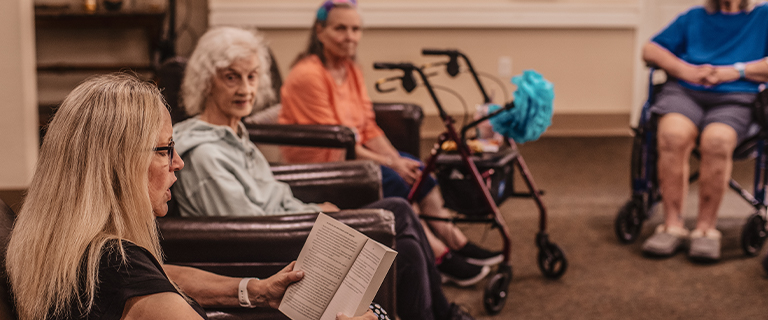Assisted living offers valuable support for older adults who need help with daily activities, but it may not meet every long-term need. As health conditions progress, some individuals require more specialized or intensive care.
When assisted living is no longer enough, options like memory care, skilled nursing, or long-term care facilities can provide the higher level of support needed. Recognizing the signs early can help ensure your loved one receives the right care at the right time.
Signs That Assisted Living is No Longer Enough
Changes in a loved one’s health or behavior can happen gradually or suddenly. Either way, it’s important to act proactively to ensure their safety and well-being. Here are some common signs that their current assisted living arrangement may no longer meet their needs:
Increasing Medical Needs
Assisted living often provides some health support, such as medication management or basic mobility assistance. However, they may not have the specialized staff or resources needed to manage chronic conditions like advanced dementia, frequent falls, or late-stage illnesses.
Worsening Memory Challenges
If your loved one is experiencing severe memory issues, such as wandering, forgetting to eat or take medications, or difficulty recognizing familiar faces, it may indicate a need for specialized memory care.
Behavioural Changes
Frequent behavioral changes, such as agitation, aggression, or mood swings, may signal that your loved one requires more personalized support. If the assisted living staff is contacting you more frequently about these issues, a higher level of care may be necessary.
Decline in Safety
If mobility issues, frequent falls, or other accidents are increasing, your loved one could be at risk. These changes may indicate that assisted living is no longer enough to keep them safe and supported, particularly if their needs go beyond what typical assisted living care is designed to manage.
Social & Emotional Isolation
Loneliness, a lack of engagement, or frustration with their environment may be signs that your loved one needs more individualized attention and activities tailored to their abilities and interests. Acknowledging these signs may be difficult but taking action helps your loved one transition into an environment where they can thrive.
Higher Level of Care to Consider
When assisted living can no longer meet your loved one’s needs, there are other care options available. These services are tailored to support specific health concerns and provide the specialized care your loved one requires.
Memory Care
Memory care is specifically designed for individuals living with Alzheimer’s, dementia, or other cognitive impairments.These communities provide:
- Secure environments to reduce the risk of wandering.
- Structured daily routines to promote comfort and familiarity.
- Specialized and compassionate staff trained to manage cognitive and behavioral challenges.
At Parsons House Preston Hollow, our Memory Care program focuses on enriching residents’ lives by providing compassionate assistance, opportunities for connection, and tailored activities to maintain cognitive stimulation.

Hospice of Palliative Care
If your loved one’s condition has progressed to a point where the focus shifts to comfort over cure, hospice or palliative care may be the right choice. These services specialize in:
- Managing discomfort.
- Emotional and psychological support for both the individual and their family.
- End-of-life planning to ensure this phase is as peaceful as possible.
These types of care are often covered by insurance or Medicare in qualifying situations, reducing financial stress.
How To Make The Transitions Easier
Transitioning into a higher level of care can be an emotional and challenging process for everyone involved. Taking intentional steps can help make the transition smoother and reassure your loved one.
Begin the Conversation Early
Begin discussions about care options as early as possible. Highlight the benefits of additional care, such as increased safety and comfort, and involve your loved one in decision-making wherever possible.
Visit Care Communities Early
Arrange tours of memory care or other communities to help your loved one feel more comfortable with the change. Meeting staff members, exploring spaces, and trying activities can ease their anxieties.
Seek Professional Guidance
Social workers, geriatric care managers, or healthcare professionals can provide invaluable advice and assistance during this process. They can help assess your loved one’s needs and recommend the most appropriate options.
Provide Emotional Support
Change can be difficult, and feelings of apprehension or resistance are natural. Be patient, validate their feelings, and focus on reassuring them that this transition is about improving their quality of life.
Stay Organized
Managing paperwork and logistics can be overwhelming. Keep important documents organized, communicate with care providers, and don’t hesitate to consult legal or financial professionals if needed.
Frame the Positives
Focus on the opportunities that come with this new chapter, such as better care, new friendships, and activities designed to meet their unique needs.
Open the Door to a New Chapter of Care
When assisted living is no longer enough, it doesn’t mean you’re out of options. Instead, it’s a chance to find the care and community that will allow your loved one to thrive in ways they couldn’t before.
At Parsons House Preston Hollow, we’re here to support you every step of the way. Whether you’re exploring memory care, hospice, or other options, our team is ready to answer your questions, offer guidance, and provide personalized, compassionate care tailored to your loved one’s unique needs.
Start this important chapter with confidence. Contact us or schedule a tour to see how Parsons House Preston Hollow can provide the care and peace of mind your family deserves.



